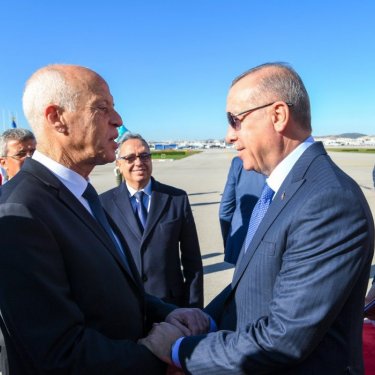Tunisia : RSF asks Tunisian president’s office to respect journalists

After seven foreign media outlets were denied access to the joint press conference that the Tunisian and Turkish presidents gave in the presidential palace in Tunis yesterday, Reporters Without Borders (RSF) reminds the Tunisian president’s office that it has a duty to treat journalists responsibly and to respect press freedom.
Reporters from Al-Jazeera, Al-Hurra, Al-Arabiya, Al-Mayadeen, Deutsche Presse-Agentur, Reuters and SIPAUSA were refused entry to Carthage Palace for the press conference that Tunisia’s President Kais Saied and his Turkish counterpart, Recep Tayyip Erdogan, gave yesterday.
Presidential guards confiscated the professional cards of journalists from the Al-Araby TV channel.
Rachida Ennaifer, the presidential adviser in charge of information and communication, said only a small number of reporters were admitted to the press conference because of the sudden nature of President Erdogan’s visit and the extensive security measures that had to be taken at short notice.
“The grounds given by the Tunisian president’s office are completely specious,” said Souhaieb Khayati, the head of RSF’s North Africa bureau. “The discrimination between media outlets, the lack of transparency and the random announcements about the presidential activities violated press freedom, one of the Tunisian revolution’s most solid achievements. We urge the president’s office to establish a clear strategy for handling journalists and ensuring that all media outlets have access to information.”
Ever since Saied’s installation as Tunisia’s president in October, Tunisian and foreign journalists have noted an amateurish approach to press relations and increasing mistrust towards journalists on the part of presidential aides.
When President Saied visited the central city of Sidi Bouzid, the cradle of the revolution, on 17 December, journalists were physically attacked by members of the presidential guard while the president and members of his staff looked on without reacting.
Since the Ben Ali regime’s fall in 2011, Tunisia has engaged in an overhaul of the country’s media sector with the aim of enabling media outlets and journalists to fully play their democratic role.
Tunisia joined some 30 other countries in September in encouraging access to freely-reported, independent, pluralistic and reliable news and information in the digital age by signing the Information and Democracy Partnership, an initiative launched by RSF.
Although much remains to be done, Tunisia’s commitment to press freedom since the revolution has borne fruit and its ranking inRSF's World Press Freedom Index has gone from 164th in 2011 to 72nd in 2019.



